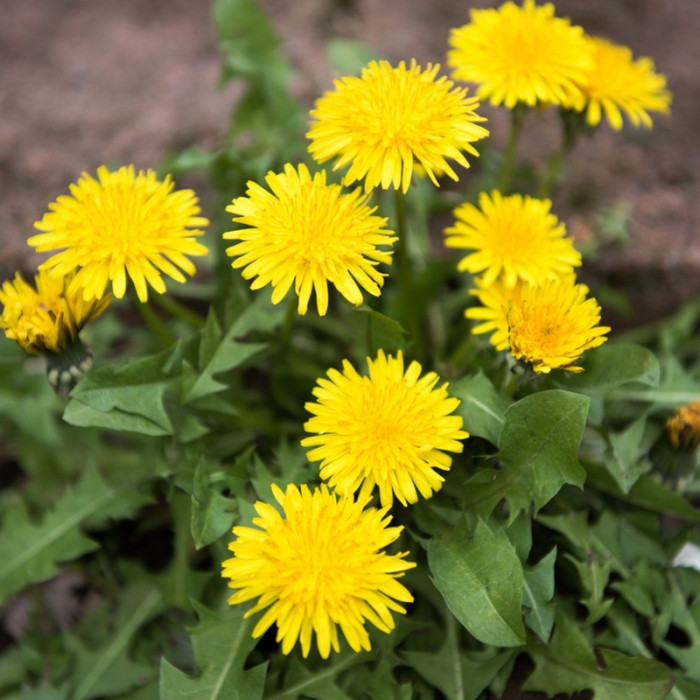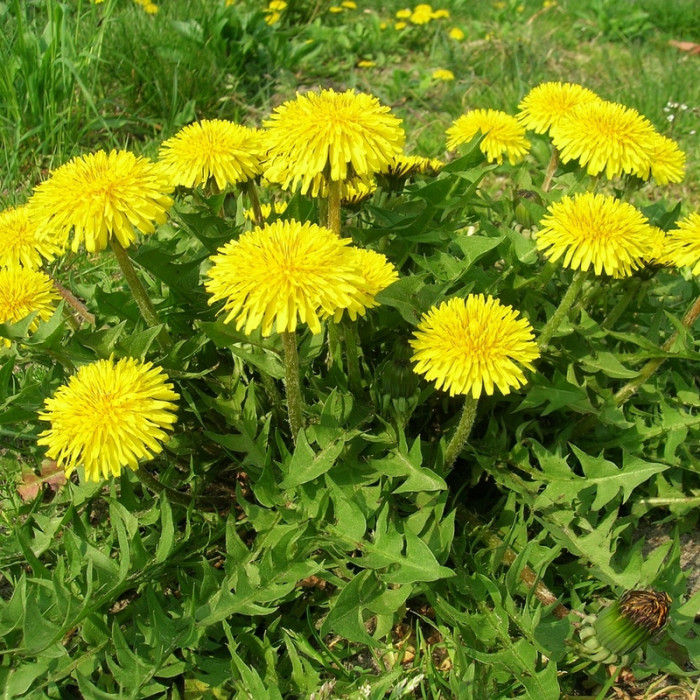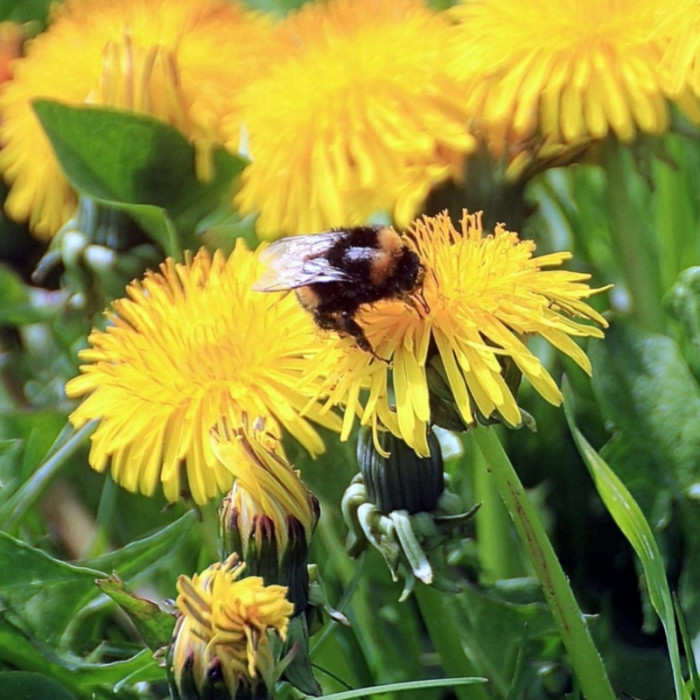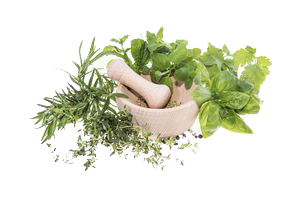Dandelion medicinal or Field dandelion, or Pharmacy dandelion, or Common dandelion / Taraxacum officinale
Perennial herbaceous plant up to 30 cm high, with a slightly branched taproot about 2 cm thick and about 60 cm long, turning into a short multi-headed rhizome in the upper part.
Dandelion leaves glabrous, pinnately incised or entire, lanceolate or oblong-lanceolate, serrated, 10-25 cm long, 1.5-5 cm wide, collected in a basal rosette.
The flower-bearing arrow of the medicinal dandelion is juicy, cylindrical, hollow inside, ending in a single basket of reed bisexual bright yellow flowers up to 5 cm in diameter. The receptacle is bare, flat, pitted.
The fruit of the dandelion officinalis is a grayish-brown spindle-shaped achene with a tuft consisting of white unbranched hairs. The achenes are loosely attached to the receptacle and are easily dispersed by the wind.
All parts of the plant contain a thick, white, milky sap that tastes bitter.
Dandelion blooms in May-June, sometimes autumn flowering is observed.
Milky juice of medicinal dandelion contains taraxacin and taraxacerin, 2-3% rubber substances, and dandelion inflorescences and leaves contain taraxanthin, flavoxanthin, vitamins C, A, B2, E, PP, choline, saponins, resins, salts of manganese, iron, calcium, phosphorus, up to 5% protein, which makes them nutritious foods. Dandelion roots contain triterpene compounds: taraxasterol, taraxerol, pseudotaraxasterol, β-amirin; sterols: β-sitosterol, stigmasterol, taraxol; carbohydrates: up to 40% inulin; fatty oil, which includes glycerides of palmitic, lemon balm, linoleic, oleic, cerotinic acids; rubber, proteins, mucus, resins, etc. Taraxanthin, flavoxanthin, lutein, triterpene alcohols, arnidiol, faradiol were found in flower baskets and leaves.
For medicinal purposes, dandelion root (lat. Radix Taraxaci), leaves, grass, juice are used. Leaves, grass and juice are harvested in June, roots - in early spring or late autumn at the stage of leaf wilt, dried in dryers at a temperature of 40-50°C.
In the spring, during flowering, dandelion officinalis gives honey bees a large amount of pollen, which contains a lot of sugar, proteins and fats. Dandelion nectar is collected by bees in small quantities and not always.
Dandelion officinalis has a choleretic, antipyretic, laxative, expectorant, sedative, antispasmodic and mild hypnotic effect.
An aqueous infusion of roots and leaves of dandelion improves digestion, appetite and general metabolism, enhances the secretion of milk in lactating women, and increases the overall tone of the body.
Due to the presence of biologically active substances, dandelion gruel passes through the intestines faster, and this helps to reduce fermentation processes in colitis.
Experimentally, in the chemical and pharmacological study of dandelion, anti-tuberculosis, antiviral, fungicidal, anthelmintic, anticarcinogenic and antidiabetic properties were confirmed.
Dandelion is recommended for diabetes, as a tonic for general weakness, for the treatment of anemia.
Dried dandelion root powder is used to enhance the excretion of harmful substances from the body with sweat and urine, as an anti-sclerotic agent, for gout, rheumatism.
A decoction, a thick extract is used as bitterness to enhance the secretion of the digestive glands and as a choleretic agent.
Dandelion is used to treat hepatitis, cholecystitis, cholelithiasis, jaundice, gastritis, colitis, cystitis, to improve appetite and digestion, with constipation, flatulence, and also as an antihelminthic.
Fresh leaves and leaf juice are recommended for the treatment of atherosclerosis, skin diseases, avitaminosis C, anemia.
An infusion of herbs along with roots is used for various diseases of the liver and gallbladder, tumors, dropsy, urolithiasis, hemorrhoids. Infusion of herbs is used for beriberi, as well as for various skin diseases: rashes, acne, furunculosis.
In Chinese folk medicine, all parts of the plant are used as an antipyretic, diaphoretic, general tonic, as well as with reduced appetite, snake bites, to increase lactation in nursing mothers, with inflammation of the lymph nodes, furunculosis and other skin diseases.
Dandelion is also used internally and externally for furunculosis, eczema, and skin rashes. An oil tincture of dandelion roots is used as a remedy for the treatment of burns, and when removing warts and calluses, the milky sap of the plant is applied topically.
Sometimes, for the treatment of eczema, an ointment is prepared from the powder of dandelion roots and honey in a ratio of 1: 2.
Dandelion officinalis has long been used as food by various peoples, it was consumed by both the ancient Chinese and the first settlers in the Americas.
Its young leaves are often used to make salad, known commercially in Europe under the French name "pisli" (the leaves are immersed for 30-40 minutes in a saline solution to significantly reduce their bitterness), and borscht, jam is cooked from dandelion flowers and they make wine, “dandelion honey” is prepared from the opened buds, and a coffee surrogate is made from roasted roots. Boiled leaves are used like spinach.
In the British Isles, a very popular wine in England has been made from dandelion flowers for a long time. This wine was sung by R. Bradbury in his story “Dandelion Wine”.
In some countries, dandelion leaves are fermented like cabbage, spring leaves are pickled.
Dandelion officinalis is also widely popular in folk cosmetics: a mask of its fresh leaves nourishes, moisturizes and rejuvenates the skin, and an infusion of flowers whitens freckles and age spots.

No questions about this product, be the first and ask your question.











